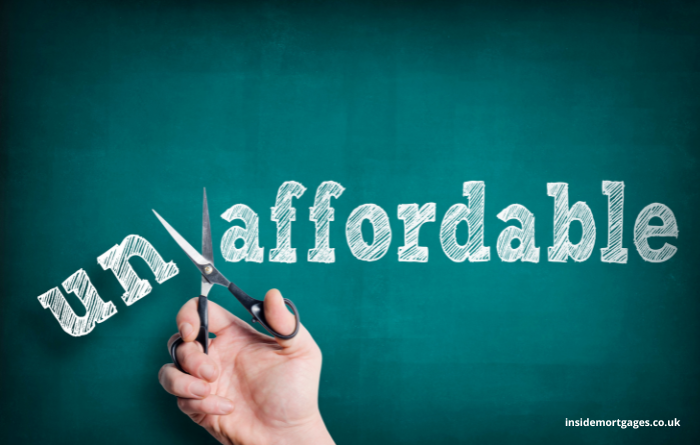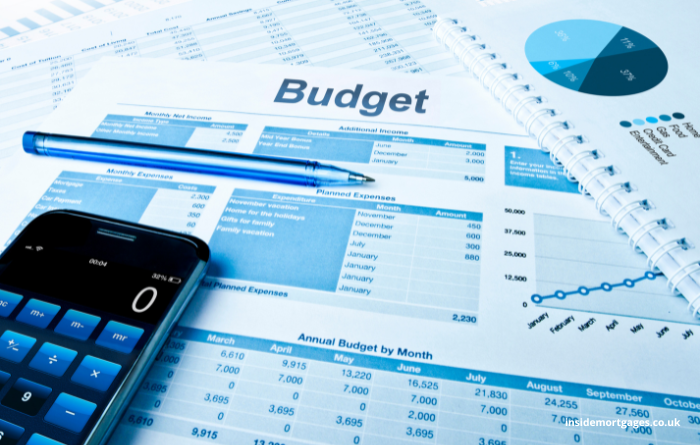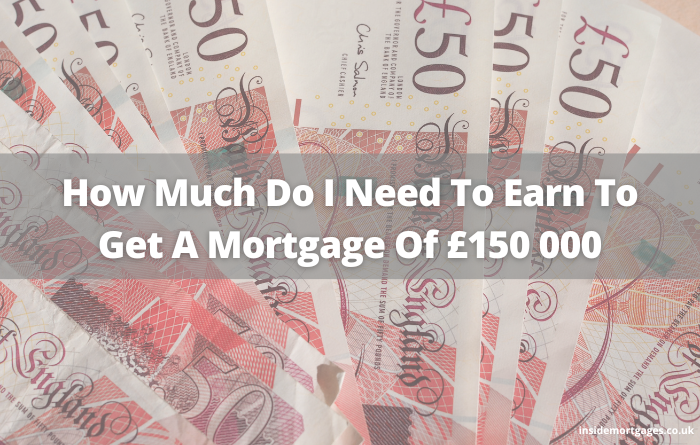How Much Do I Need To Earn To Get A Mortgage Of £150 000
Wondering how much you need to earn to get a £150,000 mortgage? The amount you need to earn to get a mortgage of £150,000 will depend on several factors, including your credit score, employment status, and debt-to-income ratio as lenders use these factors to determine your ability to repay the loan. Read on to understand in more detail what lenders are looking for when assessing your ability to repay a mortgage of £150,000.
What Salary Would I Need To Afford A £150,000 Mortgage?
Whilst every mortgage application is unique to applicant’s specific financial circumstances, as a general rule of thumb, most lenders require that your monthly mortgage payment should not exceed 28% of your gross monthly income.
So, if you want to get a mortgage of £150,000 with a 30-year term and a 4% interest rate, your monthly mortgage payment would be approximately £716. To meet the 28% rule, you would need to have a gross monthly income of at least £2,557, which is just over £30k per annum.
However, keep in mind that lenders will also consider other factors such as your credit score, employment history, and debt-to-income ratio. If you have a lower credit score, unstable employment history, or high levels of debt, you may need to earn more to qualify for a £150,000 mortgage. Conversely, if you have a higher credit score, are applying for a joint mortgage, with a stable job, and a low debt-to-income ratio, you may be able to qualify for a mortgage with a lower income.
Estimating Your Monthly Affordable Mortgage Cost

To estimate your monthly affordable mortgage cost, you should consider the following factors:
Your income: Your income is one of the most important factors when determining your affordable mortgage cost. You should calculate your gross monthly income, which includes your salary, bonuses, and any other sources of income.
Your expenses: You should also calculate your monthly expenses, including your utilities, car payments, credit card payments, groceries, and any other bills you have.
Your down payment: The amount of your down payment will affect your monthly mortgage payment. Generally, the larger your down payment, the lower your monthly payment will be.
Interest rate: The interest rate on your mortgage will also affect your monthly payment. A lower interest rate will result in a lower monthly payment.
Mortgage term: The length of your mortgage term will also affect your monthly payment. A longer term will result in a lower monthly payment, but you’ll pay more interest over the life of the loan.
Once you have these figures, you can use an online mortgage calculator to estimate your monthly mortgage payment. Be sure to choose a calculator that allows you to factor in taxes and insurance, as these costs are typically included in your monthly mortgage payment.
As a general rule, your monthly mortgage payment should not exceed 28% of your gross monthly income. However, your total debt-to-income ratio, which includes your other debts, should not exceed 36% of your gross monthly income.
Exploring Different Types of Mortgages
There are several types of mortgages available, and each type has its own features and benefits. Depending on your income and current financial situation, it’s a good idea to understand the options available to you, as some mortgage products will be more suitable to you than others.
Here are some of the most common types of mortgages:
- Fixed-rate mortgage: A fixed-rate mortgage has an interest rate that remains the same throughout the life of the loan. This makes it easy to budget for and plan your monthly payments.
- Adjustable-rate mortgage (ARM): An ARM has an interest rate that can change over time, based on market conditions. This means your monthly payment could go up or down over time.
- FHA loan: An FHA loan is a government-backed loan that is designed to help first-time home buyers or people with low credit scores. These loans have lower down payment requirements and more flexible credit requirements.
- VA loan: A VA loan is a type of mortgage that is available to veterans, active-duty military members, and their spouses. These loans often have lower interest rates and don’t require a down payment.
- Interest-only mortgage: An interest-only mortgage allows you to make interest-only payments for a set period of time, typically 5-10 years. After that, you’ll need to start making payments on the principal, which will increase your monthly payment.
- Balloon mortgage: A balloon mortgage has a lower interest rate and monthly payment for a set period of time, typically 5-7 years. After that, you’ll need to pay off the remaining balance in a lump sum payment, which can be difficult for some borrowers.
When choosing a mortgage, it’s important to consider your financial situation, long-term goals, and current interest rates. Be sure to do your research and work with a reputable lender to find the best mortgage for your needs.
Why Is Salary Important For Securing A Mortgage?
Salary is important for securing a mortgage because it determines your ability to make your monthly mortgage payments. Lenders use your salary, along with other factors such as your credit score and debt-to-income ratio, to determine whether you qualify for a mortgage and how much you can afford to borrow.
When you apply for a mortgage, the lender will calculate your debt-to-income ratio, which is the percentage of your monthly income that goes toward paying your debts. This includes your monthly mortgage payment, as well as any other debts you may have, such as credit card payments or car loans. Lenders typically prefer borrowers to have a debt-to-income ratio of 36% or less.
Your salary is also important for determining the size of your down payment. A larger down payment can help you qualify for a lower interest rate and lower monthly payments. If you have a higher salary, you may be able to save more money for a down payment, which can help you secure a better mortgage rate and save money over the life of the loan.
Finally, your salary can also affect your credit score, which is another important factor that lenders consider when evaluating your mortgage application. A higher salary can help you maintain a good credit score by allowing you to make your monthly payments on time and pay off your debts more quickly.
Budgeting Tips When Saving For A £150,000 Mortgage

Saving for a £150,000 mortgage can be a daunting task, but with proper budgeting and planning, it can be achievable. Here are some budgeting tips to help you save for a £150,000 mortgage:
- Create a budget: Creating a budget is the first step in saving for a mortgage. List all your income sources and expenses, including discretionary expenses like eating out and entertainment, and identify areas where you can cut back.
- Save for a deposit payment: The larger your deposit, the less you will need to borrow, which can reduce your monthly payments and save you money in interest over the life of the loan. Set a goal to save for at least a 10-20% down payment.
- Cut back on non-essential expenses: Look for ways to reduce your expenses by cutting back on non-essential items like dining out, entertainment, and subscriptions. Consider a cheaper cable or phone plan, or switch to a lower-cost streaming service.
- Reduce your debt: Pay off your credit card balances and other high-interest debts as quickly as possible to reduce your debt-to-income ratio and improve your credit score. This can help you qualify for a better mortgage rate.
- Shop around for the best mortgage rates: Compare mortgage rates from multiple lenders to find the best rate and terms for your budget. A lower interest rate can save you thousands of pounds over the life of the loan.
- Set up a separate savings account: Set up a separate savings account specifically for your down payment and mortgage-related expenses. This can help you stay organized and focused on your goal.
- Consider additional sources of income: Look for ways to boost your income, such as taking on a part-time job, freelancing, or selling unused items. Every bit of extra income can help you reach your savings goal faster.
Remember that saving for a mortgage requires discipline and patience. Stick to your budget, stay focused on your goal, and celebrate small victories along the way. With persistence and hard work, you can save for a £150,000 mortgage and achieve your dream of owning a home.
What Can I Afford To Buy With A £150,000 Mortgage?
The amount you can afford to buy with a £150,000 mortgage will depend on various factors, such as your income, expenses, other debts, and how much capital you have to top up the mortgage that you’re applying for.
Assuming the properties that you’re looking for are in the region of around £180,000 you could be able to afford to buy;
- A one-bedroom flat or studio apartment in some areas of the UK, especially outside of major cities.
- A two-bedroom flat or apartment in some areas of the UK, especially in more affordable cities or suburban areas.
- A small terraced or semi-detached house in some areas of the UK, especially in more affordable cities or suburban areas.
It’s important to note that the above examples are estimates and may vary depending on your individual circumstances, such as your credit score, employment history, and other debts. It’s also important to factor in additional expenses, such as property taxes, home insurance, and maintenance costs, when determining what you can afford.
To determine what you can afford with a £150,000 mortgage, it’s recommended that you speak with a mortgage lender or financial advisor, who can help you assess your financial situation and provide guidance on what you can realistically afford to buy.
Is £150k Considered A Big Mortgage?
Whether or not a £150k mortgage is considered big depends on various factors, such as the borrower’s income, expenses, and lifestyle. For some people, a £150k mortgage may be a manageable monthly payment, while for others, it may be a significant financial burden.
In general, a mortgage is considered large or small based on the borrower’s debt-to-income ratio, which is the ratio of your monthly debt payments, including your mortgage, to your monthly income. Most lenders prefer borrowers to have a debt-to-income ratio of 36% or less, which means that your monthly debt payments should not exceed 36% of your monthly income.
Assuming a standard 25-year mortgage term and a 3% interest rate, a £150k mortgage with a 20% down payment would require a monthly payment of around £570. Depending on the borrower’s income and expenses, this monthly payment may be considered manageable or significant.
It’s important to note that a mortgage is a long-term commitment, and borrowers should carefully consider their financial situation before taking on a large mortgage. It’s recommended that borrowers speak with a mortgage lender or financial advisor to assess their financial situation and determine what size of mortgage they can comfortably afford.
Summary
You should now have a better understanding of how much you need to earn to get a mortgage of £150,000. To recap, while the exact amount you need to earn to get a mortgage of £150,000 will depend on several factors, it’s important to have a stable income, good credit score, and low debt-to-income ratio to increase your chances of approval.
- You need to have a sufficient income to make the monthly payments. The amount you need to earn will depend on various factors, such as the interest rate, the length of the mortgage term, and the size of your deposit
- Lenders prefer borrowers to have a debt-to-income ratio of 36% or less, which means that your monthly debt payments, including your mortgage, should not exceed 36% of your monthly income.
- You may also want to consider saving for a larger deposit by budgeting and saving using the tips. This will reduce the amount you need to borrow therefore reducing your monthly payments and overall interest costs.

